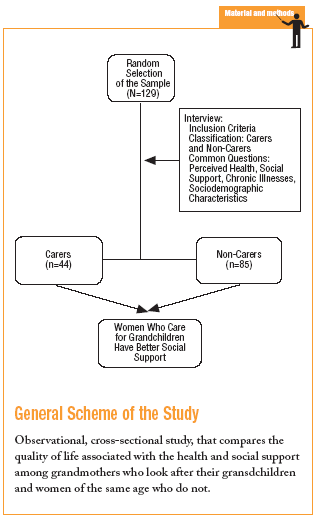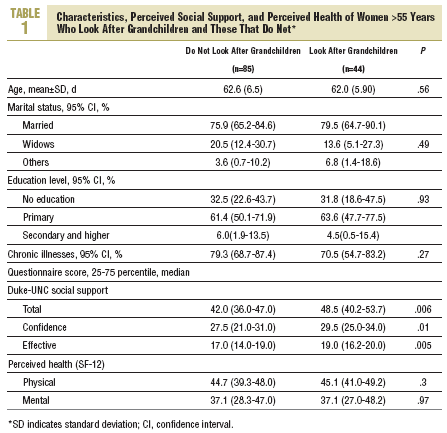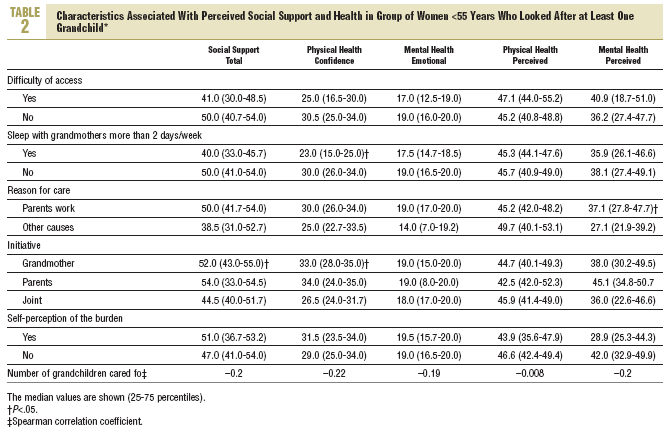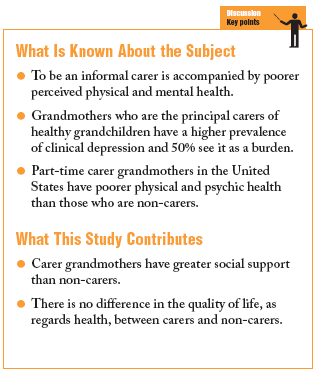Introduction
The changes in our society in the last few years, as regards family structure and the incorporation of women into the labour market, along with greater longevity of life in the population and the limited family support public services, are giving rise to the acceptance by grandparents, particularly grandmothers, of the task of supporting the bringing up of young children. Many grandmothers have become partial carers of their grandchildren and form part of the group of informal carers who take on care and support functions for members of the family.1-3
According to data from the European Community Household Panel, around 12% of Spanish women between 50 and 65 years old cared for children an average of 35 hours a week.4 Up to 5.6% of people >65 years are dedicated daily and without payment, to the care of children and, of these, the great majority are women.5
It is known that caring for dependent people leads to negative effects such as burden and stress, worse physical and psychological health and affects personal life and social relationships. However, a large part of the available evidence refers to the care of the elderly, chronic sick or children with special needs.6-8
Different studies carried out in other countries9-14 have
found lower levels of perceived health, higher psychic morbility and sense of burden in carer grandmothers. These negative effects are accompanied by positive effects which the act of looking after also have, such as the feeling of usefulness and family solidarity, self-esteem, or enjoying the grandchildren.6
The limited information provided by studies carried out in Spain basically come for the social work area and there is no data obtained from primary health care.
The objective of our study is to find out what the effects of caring for grandchildren part time have on the quality of life as regards health and social support perceived by grandmothers.
Participants and Methods
Design
Cross-sectional observational study in which the scores in the social support and quality of life related to health are compared
between 2 groups of women older than 55 years, resident in the Basic Health Area (BHA) of Montornés-Montmeló, in Barcelona, during the months of June 2003 and June 2004.
The BHA is situated in a semi-urban area, made up of 4 health centres and serves a population of 26 000 inhabitants.
Patients
The study population was obtained from an alphabetical list of women >55 years, from the primary care information system (PCIS), and the candidates were then chosen using a systematic random sample.
The women were included in the sample according following the established order and classified as carers or non-carers until the necessary sample size was obtained. The cares had to meet the following requirements: to be the carer of at least one grandchild <8 years for a minimum of 4 h daily for 5 days a week and for a period of at least 5 months in the last year.
The other group was made up of women >55 years who at the time of the study were not looking after grandchildren or did not comply with the previous requirements. The exclusion criteria were: refusal to participate, the presence of a serious acute or chronic illness in the grandchildren being looked after, to be the primary carers due to death, illness, abandonment or absence of parents, to receive regular monetary payment in exchange for caring, and looked after children who were not from their own family.
Sample Size
An * risk of 0.05 and a ß of 0.10 was accepted, in a two-sided comparison, and 2 subjects of the non-carers group were chosen for each one of the carers group, which required at least 39 subjects in the carers group and 78 in the non-carers group to detect differences é5 units on the perceived health scale.15
Data analysis was performed using the SSPS 11.0 statistics package and the R 2.0 program (R. Foundation for Statistical Computing, Vienna, Austria. ISBN 3-900051-00-3, URL http://www.
R-project.org.).
Variables
The data was collected by personal interview by professionals of the primary care team (PCT) trained by a research team. Before each interview the participants were contacted by telephone. They were informed of the objective of the study and their consent to participate in it was requested. The interviews were carried out in the health centres and general practitioner clinics of the BHA.
They were asked for information about level of studies, marital status, presence of chronic illnesses, accessibility to health services, social support, and their perception of health. To the carer women information was also asked for regarding the care of grandchildren, the jobs and health of the parents of the grandchildren, the reason why they carried out the care and perception of the burden.
For the measurement of social support the social support scale of Duke-UNC 11 was used, developed by Broadhead et al in 1988 and validated for use in Spain.16-18 The scale examines the areas of confidant support (availability of information, advice or people with whom problems can be shared) and emotional support (love, respect, sympathy, belonging to groups). The results were analysed quantitatively and categorically, classifying it as low social support if the score obtained was below 32 (15th percentile of the possible total score), or normal, if it was above.
For the measurement of the quality of life in relation to health, the SF-12 questionnaire (Short-Form Health Survey) constructed from the SF-36 (Medical Outcomes Survey
Questionnaire) was used which has been validated for use in the Spanish population18-20 and allowed the values of perceived mental and physical health to be obtained.
Statistical Analysis
The *2 test was used for the comparison of ratios as regards the carers variable. For the comparison of age, as regards the carers variable, the Student t test was used. For the comparison of the medians of the social support variable and the perceived mental and physical health according the category variables, the Mann-Whitney U test (for variables with 2 categories) and the Kruskal-Wallis test (for variables with more than 2 categories) were used. The comparison between quantitative variables was carried out using the Spearman correlation coefficient.
Results
A total of 129 women were interviewed, of which 44 (34.1%) were carers. The mean age was 62.4 (6.3) years, with a range of 53 to 79 years. Of these, 98 (77.2%) were married, 23 (18.1%) were widows, and 6 (4.7%) were in other situations. The majority of participants (62.5%) had primary school education, 32.3% had no education, and 5.5% had at least secondary education; 76.2% mentioned having a chronic illness.
In 14% of cases grandchildren slept more than 2 nights in the home of the grandmother.
No significant differences were found in the age, marital status, education level, chronic illnesses, and the perceived health between carers and non-carers (Table 1).
The quantitative analysis of the various dimensions of social support showed a difference of 2 points on the confidence scale (29.5 vs 27.5; P=.01) and 2 points on the effective one (19.0 vs 17.0; P=.005) between the carers and non-carers, respectively.
The total results showed a statistically significant difference of 6 points in favour of a better perceived social support in the group of women carers.
The percentage of women who considered that they had a low level of social support (total score <32 points) was greater in the non-carers group than in the carers (15.3% vs 6.8%, respectively), although the difference was significant.
Carer Grandmothers Subgroup
Among the carer grandmothers, caring for one grandchild was most common (46.5%). Of these grandmothers, 11.6% had difficulties in gaining access to the family doctor and 32.6% felt overburdened by caring for grandchildren. The mother as well as the father worked in 90.7% of cases and in 54.5% the initiative for care was taken together between the parents of the children and grandparents.
The confidence support was less when the grandchildren slept regularly in the grandmother's home (Table 2). The carer grandmothers obtained a significantly higher score in perceived mental health when the reason for the care was the parents working. The perceived total and effective support were significantly higher when the initiative of the care was taken by the parents. Physical health was worse when the number of grandchildren that had to be looked after by the grandmothers was greater.
Discussion
Our study shows that the social support perceived by grandmothers who care for their grandchildren is greater than that of women of the same age who do not do this.
The general characteristics which could have acted as confounding variables in the perceived social support and health (age, education level, marital status, chronic diseases) were similar in both groups. The percentage of women who perceived a low social support (less than 32 points) was greater in the non-carers, although in this case it was not significant. This could be due to different reasons, such as a small sample size, that the differences were limited or that the cut-off point on the scale might not have been sufficiently sensitive in the analysis of differences. The author of the questionnaire has actually advised against using the 11 items scale, but it is currently the only one validated in Spain.
Although other studies have shown worse levels of mental health in grandmothers who look after their children,10-13 in our population no significant differences were found in mental health or perceived physical health between the 2 groups of women. The explanation could lie in the differences in the determining social cultures between the grandmothers who took part in our study and those in English speaking countries, with different family patterns and support networks. These factors have been shown to be fundamental in the self-perception of health.22-24
The subjective burden has been associated with the emotional response to the carers demands and the caring experience.25 The carers of our study showed less of a burden than that obtained in other studies carried out with grandmothers who took on the total care of the grandchildren (primary carers).6 We can believe that grandmothers naturally take on the secondary care of grandchildren and very likely this might be a source of satisfaction and reinforcement of family ties and relationships, particularly with the children. This could explain why the perceived support is greater when the children ask the grandmothers to look after the grandchildren and, particularly when the reasons are related to work.
In the opposite extreme is the deterioration, which the grandmothers have as regards confidence support, when the grandchildren habitually sleep in their home, possibly because it limits their own personal relationships.
Limitations of the Study
Despite this not being a multi-centre study, the social cultures of the population studied are similar to those of other industrial belts in large Spanish cities. The fact that the sample may have been taken from the ascribed population and not from daily clinics or specialised social care centres increases the external validity in regard to other studies. The limitations entailed in the use of scales which have not been applied in similar studies and whose validity is subject to temporal and social-cultural changes.
It will be of interest to evaluate the impact of this phenomenon in our country in the next few years, when the proportion of women in this age band with work commitments increases and on those where the job of informal care of grandchildren are added to their normal tasks if they cannot rely on other public resources.
Conclusion
The care of grandchildren improves the perceived social support by grandmothers and has no significant effect on their health.















